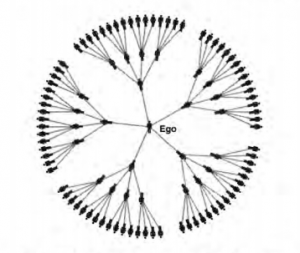In Duncan Watts’ piece, ‘Six Degrees: The Science of a Connected Age’, he discusses the interconnected nature of todays society through the analogy of the six degrees of separation. These findings, conducted by Stanley Milgram concluded that everyone in the world is connected through a network of 6 people. The studies that went into proving this theory, though conducted entirely within one nation, stand up for a larger truth; that being the world is a ‘small’ place, albeit maybe not physically when scaled against what one would typically classify as small, but in terms of the earths inhabitants, and how interconnected we all are.
Image source – Watts, Duncan J. Six Degrees: The Science of a Connected Age.
Milgram’s study was conducted in 1967, before the Internet existed, and since then Microsoft has gone on to conduct their own study based on Milgram’s original findings, to test the reliability of the theory. As opposed to being a study conducted on a limited number of people in a limited number of states within the US, Microsoft’s study used data on a planetary scale – analyzing 30 billion conversations held between 180 million people worldwide, which amounted to roughly half of the world’s instant messaging for 2006, the year it was conducted. Microsoft’s findings concluded that on average, every person on earth could be connected through 6.6 degrees of separation, with 78 percent of the population being entirely interconnected in as little as 7 steps.
Image Source – www.hjsessentia.co.uk/internet-services/




